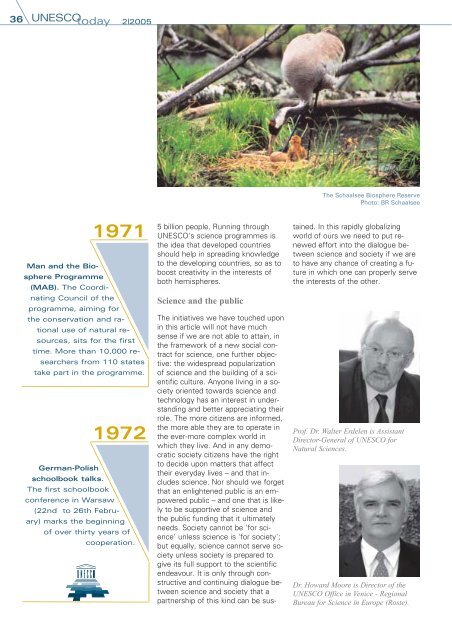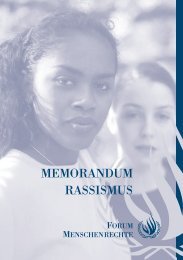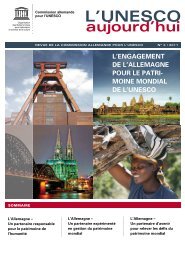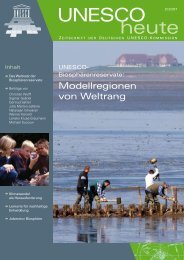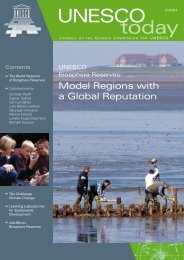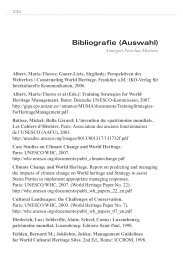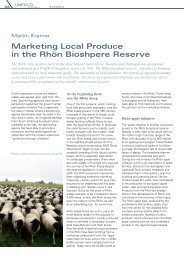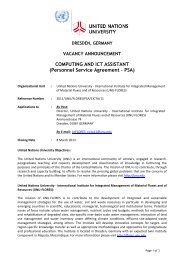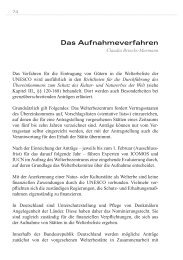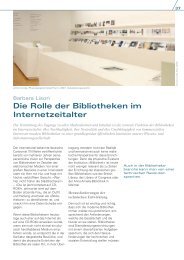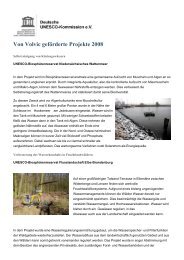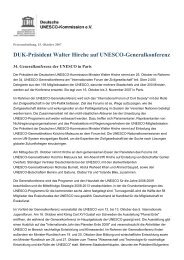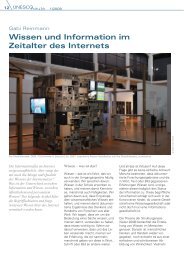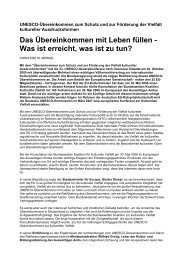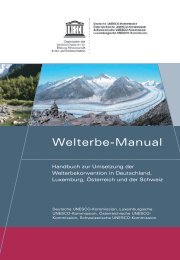Download - UNESCO Deutschland
Download - UNESCO Deutschland
Download - UNESCO Deutschland
You also want an ePaper? Increase the reach of your titles
YUMPU automatically turns print PDFs into web optimized ePapers that Google loves.
36<br />
<strong>UNESCO</strong> today<br />
2|2005<br />
1971<br />
Man and the Biosphere<br />
Programme<br />
(MAB). The Coordinating<br />
Council of the<br />
programme, aiming for<br />
the conservation and rational<br />
use of natural resources,<br />
sits for the first<br />
time. More than 10,000 researchers<br />
from 110 states<br />
take part in the programme.<br />
1972<br />
German-Polish<br />
schoolbook talks.<br />
The first schoolbook<br />
conference in Warsaw<br />
(22nd to 26th February)<br />
marks the beginning<br />
of over thirty years of<br />
cooperation.<br />
5 billion people. Running through<br />
<strong>UNESCO</strong>'s science programmes is<br />
the idea that developed countries<br />
should help in spreading knowledge<br />
to the developing countries, so as to<br />
boost creativity in the interests of<br />
both hemispheres.<br />
Science and the public<br />
The initiatives we have touched upon<br />
in this article will not have much<br />
sense if we are not able to attain, in<br />
the framework of a new social contract<br />
for science, one further objective:<br />
the widespread popularization<br />
of science and the building of a scientific<br />
culture. Anyone living in a society<br />
oriented towards science and<br />
technology has an interest in understanding<br />
and better appreciating their<br />
role. The more citizens are informed,<br />
the more able they are to operate in<br />
the ever-more complex world in<br />
which they live. And in any democratic<br />
society citizens have the right<br />
to decide upon matters that affect<br />
their everyday lives – and that includes<br />
science. Nor should we forget<br />
that an enlightened public is an empowered<br />
public – and one that is likely<br />
to be supportive of science and<br />
the public funding that it ultimately<br />
needs. Society cannot be 'for science'<br />
unless science is 'for society';<br />
but equally, science cannot serve society<br />
unless society is prepared to<br />
give its full support to the scientific<br />
endeavour. It is only through constructive<br />
and continuing dialogue between<br />
science and society that a<br />
partnership of this kind can be sus-<br />
The Schaalsee Biosphere Reserve<br />
Photo: BR Schaalsee<br />
tained. In this rapidly globalizing<br />
world of ours we need to put renewed<br />
effort into the dialogue between<br />
science and society if we are<br />
to have any chance of creating a future<br />
in which one can properly serve<br />
the interests of the other.<br />
Prof. Dr. Walter Erdelen is Assistant<br />
Director-General of <strong>UNESCO</strong> for<br />
Natural Sciences.<br />
Dr. Howard Moore is Director of the<br />
<strong>UNESCO</strong> Office in Venice - Regional<br />
Bureau for Science in Europe (Roste).


